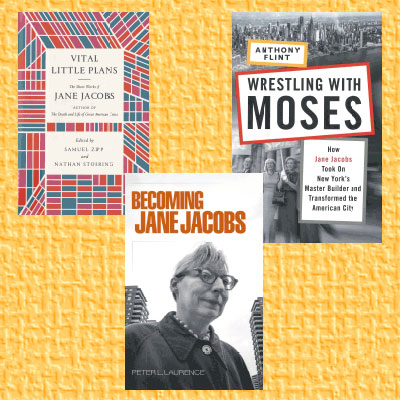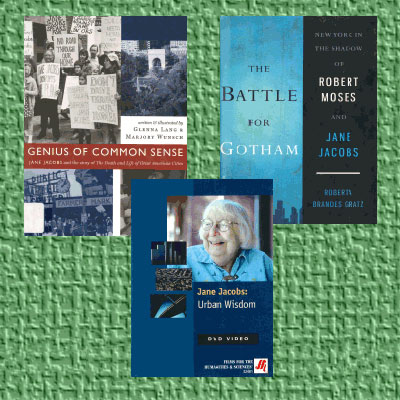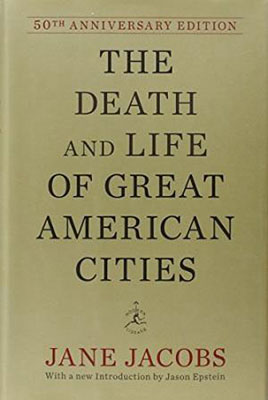 Jane Jacobs was an American freelance writer, wife and mother who became one of the most important and influential figures of urban planning as we recognise it today.
Jane Jacobs was an American freelance writer, wife and mother who became one of the most important and influential figures of urban planning as we recognise it today.
With May being the month of her birth, our display celebrating the city, “The Civic”, and a new documentary on Jane Jacobs now showing in UK cinemas, it is timely to reflect on the legacy she continues to have.
She came to public awareness in the 1960s as part of the public demonstrations against New York City planner Robert Moses’ plans to create a Lower Manhattan Expressway (LOMAX). This plan would have required the extension of 5th Avenue and the destruction of Washington Square Park – an important utility central to the Greenwich Village community. A simplified explanation of these opposing factions can be to align Moses with the automobile and Jacobs with the pedestrian.1
 This clash of philosophies became a David-and-Goliath story that engaged the public but also developed a growing public awareness of what it actually means to be part of a thriving urban community. She faced strong critique from those in power who attacked her for her lack of formal planning education and her primary role as a housewife.
This clash of philosophies became a David-and-Goliath story that engaged the public but also developed a growing public awareness of what it actually means to be part of a thriving urban community. She faced strong critique from those in power who attacked her for her lack of formal planning education and her primary role as a housewife.
These comments were reflective of the era and also unfair. Jacobs was married to an architect and had been writing since the 1930s, and, via her freelance work, had gained valuable experience in the field whilst working for architectural publications.2
She is most famous for her 1961 title “The Death and Life of Great American Cities”. This has been continually in print since publication and seen as essential reading in planning education. Jane Jacobs continued throughout her life to write on urban planning with her last book being published in 2004.
This is but one of the resources held at either the Architecture and Planning Library or General Library that are written by or about Jane Jacobs…
 Authored by Jane Jacobs
Authored by Jane Jacobs
The death and life of great American cities. New York: Random House, 1961.
The economy of cities. New York: Random House, 1969.
Cities and the wealth of nations: Principles of economic life. New York: Vintage Books, 1985.
Systems of survival: A dialogue on the moral foundations of commerce and politics. New York: Vintage Books, 1994.
The nature of economies. New York: Modern Library, 2000.
Dark Age ahead. New York: Random House, 2004.
Samuel Zipp & Nathan Storring, Eds. Vital little plans: The short works of Jane Jacobs. New York: Random House, 2016.
About Jane Jacobs
Flint, Anthony. Wrestling with Moses: How Jane Jacobs took on New York’s master builder and transformed the American city. New York: Random House, 2009.
Goldsmith, Stephen Arthur & Lynne Elizabeth. What we see: Advancing the observations of Jane Jacobs. Oakland: New Village Press, 2010.
Gratz, Roberta Brandes. The battle for Gotham: New York in the shadow of Robert Moses and Jane Jacobs. New York: Nation Books, 2010.
Lang, Glenna & Wunsch, Marjory. Genius of common sense: Jane Jacobs and the story of The Death and Life of Great American Cities. Boston: David R. Godine, Publisher, 2009.
Laurence, Peter L. Becoming Jane Jacobs. Philadelphia: University of Pennsylvania Press, 2016.
Shubert, Dirk. Ed. Contemporary perspectives on Jane Jacobs: Reassessing the impacts of an urban visionary. Farnham: Ashgate, 2014.
Sparberg Alexiou, Alice. Jane Jacobs: Urban visionary. New Brunswick: Rutgers University Press, 2006
Jane Jacobs urban wisdom. Cinematography by Don Alexander. Princeton: Films for the Humanities, 2003. DVD
Jane Jacobs passed away in 2006 but she continues today to be an important figure in urban discussion with the latest offering a documentary by Matt Tyrnauer.
“Citizen Jane – Battle for the City”, released in UK cinemas May 2017. Trailer
Fiona Lamont, Library Assistant, Architecture and Planning Library
References
1 Roberta Brandes Gratz, The battle for Gotham: New York in the shadow of Robert Moses and Jane Jacobs (New York: Nation Books, 2010).
2 Peter L. Laurence, Becoming Jane Jacobs (Philadelphia: University of Pennsylvania Press, 2016).
